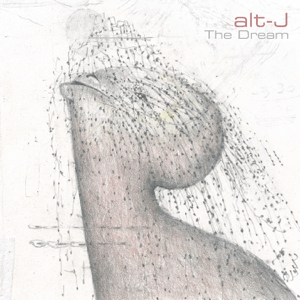What is your dream life? What do you do if you’ve realized that your dream isn’t materializing the way you had hoped? Leeds trio alt-J (Joe Newman, Thom Sonny Green, Gus Unger-Hamilton) explore wishful thinking in their intriguing fourth record The Dream. For starters; brands and products can trigger false hope for happiness. Opener ‘Bane’ begins with a fake advertisement for Coca Cola, in which it promotes the drink as “Cold and sizzling.” Australia psychedelic group Pond had a similar tongue-in-cheek approach to commercials on their album The Weather. The alt-J’s song’s teenage protagonist buys into this advert and begins developing an unhealthy reliance on the refreshment to get through his adolescence: “I sold my soul. For a sip at school. A swimming pool. Ice cold black fuel/ And when my parents tell me to come in. I’ll just ignore them and keep on drinking. Cola, cola. Fizzy cola.” It’s as if he has become a brainwashed servant to the corporation. Sounds of drinks being poured and the pssssssssssch can opening noise among the vocals of Highgate School choir and the crumhorn are effectively subliminal. The swaggering ‘Hard Drive Gold’ – in which Joe Newman’s voice takes on the palette of Nick Cave – also attempts to convince a boy in his childhood to buy into a scheme. It tells him that he invests in cryptocurrency, he will become a millionaire overnight and then can brag to his teachers and neighbours. Making it sound all too easy. “Gimme that gold. Straight into my hard drive, baby”.
The Hollywood dream also promises happiness to wannabe stars. ‘The Actor’ presents the disappointing reality that can lie in wake for those who wish to enter the system. It goes inside the mind of an entertainment newbie who is staying at the apparent death trap accommodation known as the Chateau Mormont hotel. It was the real place that The Blues Brothers’ actor John Belushi died in 1982 after a receiving a fatal cocktail of narcotics, and the song’s protagonist appears to be following an identical path of self-destruction. “All-American jawlines. One room going over same lines. Grind the script like teeth”, could describe both the act of cocaine-taking and rehearsing for a potential acting role. Perhaps the actor himself can no longer differentiate between the two practices. ‘Philadelphia’ – one of two tracks named after an American city – is even more descriptive about death, as it recalls the last moments of a man dying in an alley way. It’s the most musically surprising track on The Dream, with it’s inclusion of operatic vocalist Christie Valeriano belting out over harpsichord.
If you think that’s a dark turn for alt-J, ‘Happier When You’re Gone’ and ‘Losing My Mind’ go even further into true crime territory. The string-filled and choral former is from the perspective of a woman who has murdered her abusive partner and then burned the remains. The sound of fire can be heard on the track. However ‘Losing My Mind’ is more haunting. Containing harsher industrial sounds within its folk rock, the track seems to be from the perspective of a serial child killer victim, who believes he has become yet another unavenged statistic. “Oh legacy is a picture of me. On holiday in the late seventies. Drying after swimming, my father calls to me. /Now that picture is displayed with fifteen other missing boys.” Joe Newman’s father worked as probation officer for the Lucy Faithfull Foundation, that attempts to tackle the problem of sex offenders by trying to understand their psyche. The end to the song could be from the viewpoint of a perpetrator with the lines “what it means to be man? I’m losing my mind and “cut from the same cloth”.
Although not the most musically interesting, the simplistic folk song ‘Get Better’ is perhaps the most powerful track lyrically on The Dream. At just under six minutes long, its enough time to the story of a couple going through the difficulty of an illness. The first part is the carer attempting cheer up his partner, as she suffers from pain. Lines like “I’m listening to you cover Elliot Smith’s Angeles'” give a warm, personal sensibility. The second part hints that things get more fatal and the protagonist is attempting to deal with their loss. In stages, such as denial: “I still pretend you’re only out of sight in another room. Smiling at your phone” and acceptance: “My darling, I know I will. Like holding onto memories.”
This track puts the idea of pipe-dream thinking into much needed context. Do we become too greedy? Too self-involved? Weighing too much expectation on an unnecessary ambition, when we should be focusing on the simpler things in life and the loved ones close to us? Food for thought this Valentine’s Day.




